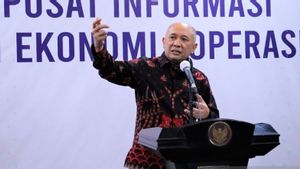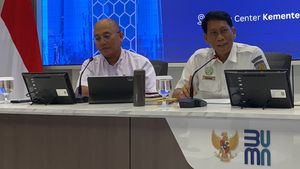JAKARTA - Head of the Center of Innovation and Digital Economy Institute for Development of Economics and Finance (Indef) Nailul Huda assesses that to overcome illegal online loans (pinjol) which continues to flourish, digital and financial literacy programs must target the family level.
"From the demand side, increasing digital and financial literacy must be prioritized first. Digital and financial literacy programs need to target elements of the community down to the family level", Nailul said when quoted from Antara, Tuesday, August 24.
Meanwhile, from the supply side, it is necessary to increase the number of legal or official loans operating in Indonesia. Currently, continued Nailul, only five percent of legal loans are operating in the country, the rest are illegal loans.
According to Nailul, to reduce the number of perpetrators and victims of illegal lending, it must be done from two sides, both the demand and supply of illegal loans.
Nailul said that the eradication of illegal loans is currently focused on finding the illegal loans through efforts to eradicate or close services or applications. However, he considers closing the application or service to be less effective because of the nature of the application, which can be renamed and duplicated by the system easily.
"The term is closed, one can return to 100 similar applications. From the demand side, it is still growing. Data from the Financial Services Authority (OJK), the demand to create an account at an official or legal loan is still growing in the midst of a pandemic. This means that it is very likely that the demand to become a customer of an illegal loan will also continue to grow too", said Nailul.
Then another most important thing, according to Nailul, is the immediate ratification of the Personal Data Protection Law to protect the public from illegal fraudulent lending practices.
"There are so many cases of illegal borrowing that trap people to borrow in the application", he said.
To strengthen measures to eradicate illegal lending, at the end of last week, five institutions, including the Financial Services Authority (OJK), Bank Indonesia (BI), the Indonesian National Police (Polri), the Ministry of Communication and Information of the Republic of Indonesia (Kominfo) and the Ministry of Cooperatives. and Small and Medium Enterprises of the Republic of Indonesia (Kemenkop UKM) gave a joint statement.
SEE ALSO:
The follow-up to the joint statement of the five institutions will be realized in a Cooperation Agreement (PKS) which will contain steps from each ministry/institution that are coordinated in the Investment Alert Task Force (SWI).
Later, each of these institutions will strengthen the task of eradicating illegal loans in their respective fields, both in prevention, response to complaints, and also law enforcement.
Bank Permata chief economist, Josua Pardede, assessed that the cooperation between the five institutions is expected to be able to limit the movement of the mushrooming illegal loans. However, he said one thing that needs to be considered from these institutions again is the modus operandi of illegal lending, which no longer uses official application providers such as the Play Store and App Store as a basis but from the Application Package Files (APK) which are widely available from the Internet.
"Using devices from the Police and the Ministry of Communication and Information, it is very possible that APKs and service provider sites can be tracked so that illegal borrowing can be prevented", said Josua.
From the OJK side, continued Josua, outreach, and outreach to the public can be a form of prevention policy so that the community avoids the snares of illegal lending. OJK may also need to provide counseling to the general public because it is not impossible for the public to be attracted to the lure of borrowing for consumption loans.
"Regarding the urgency, SWI may be able to prioritize from the side of public complaints to reduce the negative impact of illegal lending, along with the wide impact that arises from illegal lending, especially in terms of people's personal data", said Josua.
The English, Chinese, Japanese, Arabic, and French versions are automatically generated by the AI. So there may still be inaccuracies in translating, please always see Indonesian as our main language. (system supported by DigitalSiber.id)


















